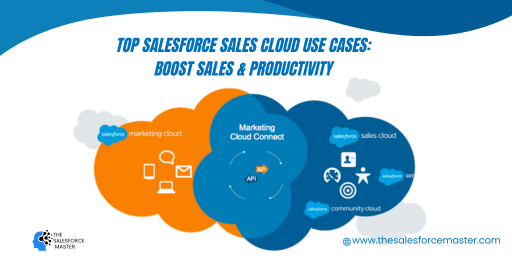
What Is Salesforce Sales Cloud?
Salesforce Sales Cloud serves as a robust customer relationship management (CRM) solution designed to enhance sales processes. This platform facilitates the creation of leads and their subsequent conversion into Account, Contact, and Opportunity records. By leveraging Sales Cloud, an organization can significantly boost the efficiency and productivity of its sales team, ultimately leading to increased sales figures. It distinguishes itself from conventional methods, providing a unique approach to managing and optimizing the sales process. As a result, the sales process within Sales Cloud offers a comprehensive view of a company’s customer opportunities, whether they are currently in the pipeline or have already been successfully concluded.

What can you do with Sales Cloud?
Sales Cloud offers many capabilities, such as managing accounts and customers, creating quotes, and generating invoices. Nevertheless, it boasts some distinct features, which can be outlined as follows:
1. Campaign Management
2. Lead Management
3. Opportunity Management
4. Sales Forecasting
5. Territory Management
6. Sales Performance Management
Take a look into these unique features in detail:
1. Campaign Management:
A campaign management system provides a centralized platform for storing comprehensive information related to marketing campaigns designed for specific products. This system is intricately connected to your existing products within your Salesforce Customer Relationship Management (CRM) system. Furthermore, it serves the dual purpose of promoting your business and enhancing your organization’s branding efforts.
2. Lead Management
In Lead Management, after your campaign concludes, you acquire new leads. The lead management feature helps you examine these leads comprehensively, providing you with all the specific details you recorded during the campaign. Each lead is associated with the campaign, meaning that when you access a campaign in your Sales Cloud, you gain a comprehensive view of your leads. Additionally, you can assign scores to your leads based on their interactions.
Lead-generation campaigns encompass a range of activities, such as direct mail, bulk email, webinars, conferences, trade shows, or industry-specific gatherings. On the other hand, brand-building campaigns encompass various types of advertising efforts.

3. Opportunity Management
Opportunity records are essential for keeping a comprehensive account of your sales processes. They serve as the focal point where sales representatives invest the majority of their time. Once a lead is successfully converted, it triggers the creation of an opportunity, indicating that it’s time to provide quotations and generate invoices. These opportunities are closely associated with customer accounts and offer insights into the success and failures of your business deals. Moreover, when you require assistance from a team member during your sales journey, the Opportunity Team feature enables another person to collaborate effectively within your sales pipeline.

4. Sales Forecasting
Using your completed transactions, you can anticipate revenue generated from those deals. To facilitate this, you employ forecasting, a process that predicts your sales revenue by analyzing information from your opportunities and the data collected through marketing campaigns. Forecast management enables managers to make projections about future sales by examining historical sales data.
5. Territory Management
Sales professionals typically operate within specific geographical areas, and Salesforce’s Sales Cloud offers a solution for this in the form of Territory Management. This feature allows you to establish various territory types, create a model for allocation, and then designate users and accounts accordingly. It’s accessible in the Enterprise and Unlimited Editions of Sales Cloud.
6. Sales Performance Management
A Product and Price book is a valuable tool for sales professionals to efficiently track their company’s existing products and associated prices. With this information at their fingertips, they can promptly generate quotations for customers. Additionally, they can easily verify the validity of any special offers mentioned in the quotation. Quotations serve as a means for customers to gain insights into the pricing of products and services, including the availability of any discounts. A notable advantage of quotations is their seamless integration with the sales opportunity management process.
Business Case/Summary
Let’s examine a business scenario where a chemical manufacturing company utilizes Salesforce’s Enterprise Edition, specifically the Sales Cloud, with unique customizations to drive their operations. In addition to the standard Sales Cloud features, they’ve incorporated custom objects to store data and facilitate their sales revenue generation.
Their sales team initiates leads, engages in product discussions, and explores innovative solutions with customers. Sales representatives use custom objects to request and track specialized customer requests. They also create tasks for the Research and Development (R&D) team, who then work on these unique customer requests. The R&D team provides feedback or delivers final products back to the sales team.
Once the sales team finalizes products based on R&D team feedback, they generate quotations and coordinate with the Sample Dispatch team to send samples to the delivery team. After the samples are dispatched to the customer’s address, the company uses automation tools via email to collect feedback from customers.
This company has harnessed the power of Salesforce Service Cloud. Sales Cloud enables them to customize their business processes with automation tools and gain a comprehensive 360-degree view of their customers. With Sales Cloud, they efficiently close deals, ensuring faster and more streamlined operations.

